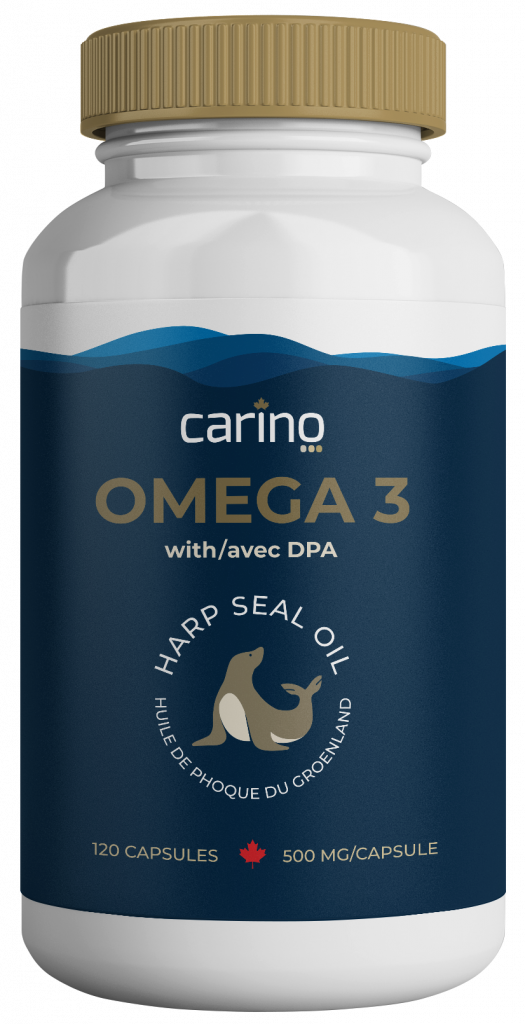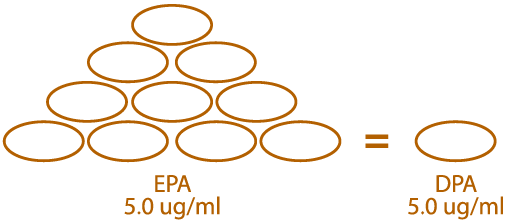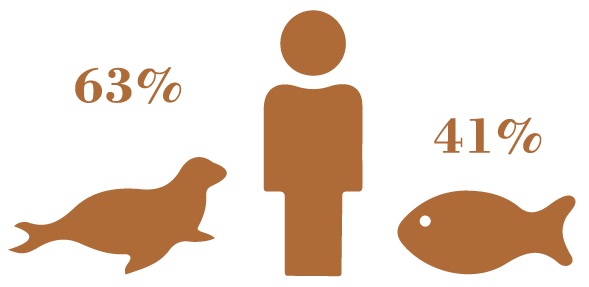Seal Oil
Seal Oil originating from the icy waters of the North Atlantic are rich in essential fatty acids, such as Omega-3. There are 3 types of Omega-3 polyunsaturated fatty acids (PUFAs), it is DHA, EPA, and DPA.

Seal Oil. Maximize Your Health Potential.

What is Seal Oil ?
Seal oil, originating from the icy waters of the North Atlantic, is rich in essential fatty acids, such as Omega-3. There are 4 types of Omega-3 polyunsaturated fatty acids (PUFAs); DHA, EPA, DPA, and ALA (plant-based). None of which are naturally synthesized by the human body, yet are critical for its proper functioning. These powerful fatty acids must be obtained from outside sources.
Who should take Seal Oil ?
Who can benefit from seal oil’s special properties?
Consuming seal oil offers a vast and diverse range of health benefits. Seal oil can improve the quality of life of people of all ages!
Why Choose Seal Oil?
Fish oils and plant-based omega-3 supplements contain DHA and EPA. Seal oil, however, contains DHA, EPA, and DPA. DPA is naturally occurring in a mother’s breast milk and is proven to have powerful health benefits. DPA is also shown to intensify the positive effects that EPA and DHA have on the body! Thus, a smaller amount of seal oil is equally or more effective than a larger dose of fish oil or plant-based omega-3 supplements!
The power of DPA
10x more effective than EPA
Studies have shown that people using just 1/10th the amount of DPA compared to EPA can get the same health result.

Together, these omega-3s are instrumental in the prevention of heart disease, cardiovascular disease, hypertension, inflammatory diseases such as Rheumatoid arthritis and Crohn’s disease, as well as depression and cancers and a number of skin diseases.
An Omega-3 that absorbs better
A scientific study has shown that after 14 days of supplementation, the total level of Omega-3s in the body of those consuming seal oil was more than 20% greater compared to those consuming fish oil.

In addition to this, seal oil is more readily and effectively absorbed and utilized by the mammalian body than other non-mammalian sources of Omega-3. Again, a smaller amount of seal oil is equally or more effective than a larger dose of fish oil or plant-based omega-3 supplements!
Our Process & Facility
Initially rendered in Newfoundland, Canada, all of our oil is then further refined in a process known as ‘Bleaching and Deodorization’. This additional refining reduces the concentration of trace metals, oxidation values, PCBs, dioxins, and furons, maximizing health benefits for our customers.
The Canadian Food Inspection Agency (CFIA) and Health Canada certify all facilities used in the production chain. The resulting oil meets or exceeds all Canadian and World Health Organization (WHO) standards.
Nutritional information:
(per 500mg capsule)
Omega-3 PUFAs/Omega-3 AGPI : 115 mg
EPA : 34 mg
DHA : 45 mg
DPA : 20 mg
Saturated Fat : 60 mg
Omega-9 : 140 mg
What does Research Show ?
Pregnancy / Fetal Development
Studies show that Omega-3 supplementation during pregnancy prevents pregnancy-induced hypertension. So, it prolongs gestation, increases birth weight and reduces the incidence of premature birth. DHA is essential for the development of the brain, eye and nerve tissues during pregnancy. DHA supplementation during pregnancy and breast-feeding may reduce the risk of the child developing immune problems and allergies.
Infant / Child Development
DHA is essential for the development of the brain, eye, and nerve tissues during the first years of a child’s life. It is especially important in the development of infants’ visual acuity and motor skills.
Inflammation / Arthritis
Due to the anti-inflammatory effects of EPA and DPA, research shows that people with diets rich in this fatty acid are less prone to inflamed joints (Rheumatoid arthritis), inflammation of the intestine (Crohn’s disease), Lupus, asthma, multiple sclerosis, and skin disease (eczema, psoriasis).
Diabetes
Research documents the positive effects of Omega-3 on insulin receptor sites in membranes. The reduction in insulin performance has been linked to the decrease in dietary Omega-3 consumption. Several diabetic patients have been able to control the intensity of circulatory-related pain associated with diabetes by supplementing their diets with Omega-3.
Heart Disease
Studies show that DPA is involved in the healing process associated with cardiovascular disease. Research has indicated that Omega-3 reduces blood vessel blockages. Therefore, it can reduce the risk of primary cardiac arrest by 70%. Other work demonstrates that fatty acids can prevent sudden death from irregular heartbeats following a heart attack. Yet another study has found that a diet rich in Omega-3 can reduce the chances of a second heart attack by 30%.
Mental & Cognitive Health
The biological importance of DHA in the development of the brain and retina is well established. This is important in maintaining brain and eye function in all stages of life. Recent studies highlighted the beneficial effect of Omega-3 fatty acids in Alzheimer’s Disease. It may be attributed to their antioxidant, anti-inflammatory, antiapoptotic and neurotrophic properties.
Cancer
Seal oil has a natural resistance to oxidation. There is significant research linking anti-oxidants to a reduction in free radical acids – and therefore – reducing the risk of cancer and other diseases.
One major study shows that daily Omega-3 consumption dramatically slows abnormal cell growth that can lead to colon and prostate cancer. Another study showed similar success impeding breast cancer.


